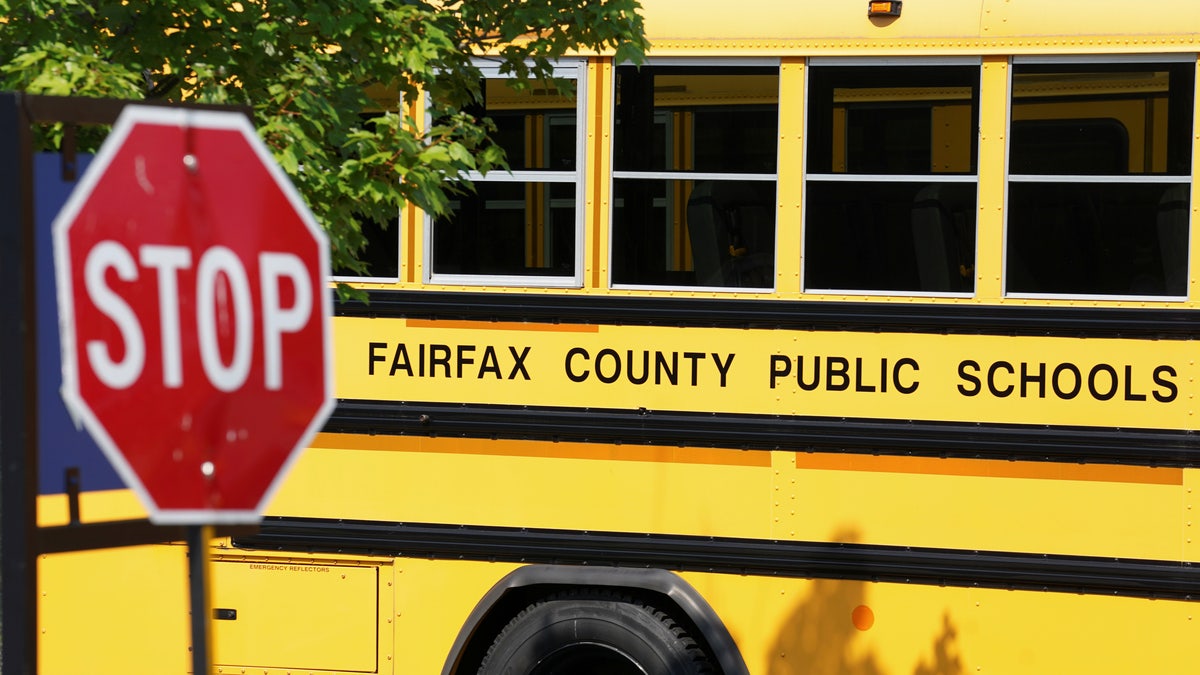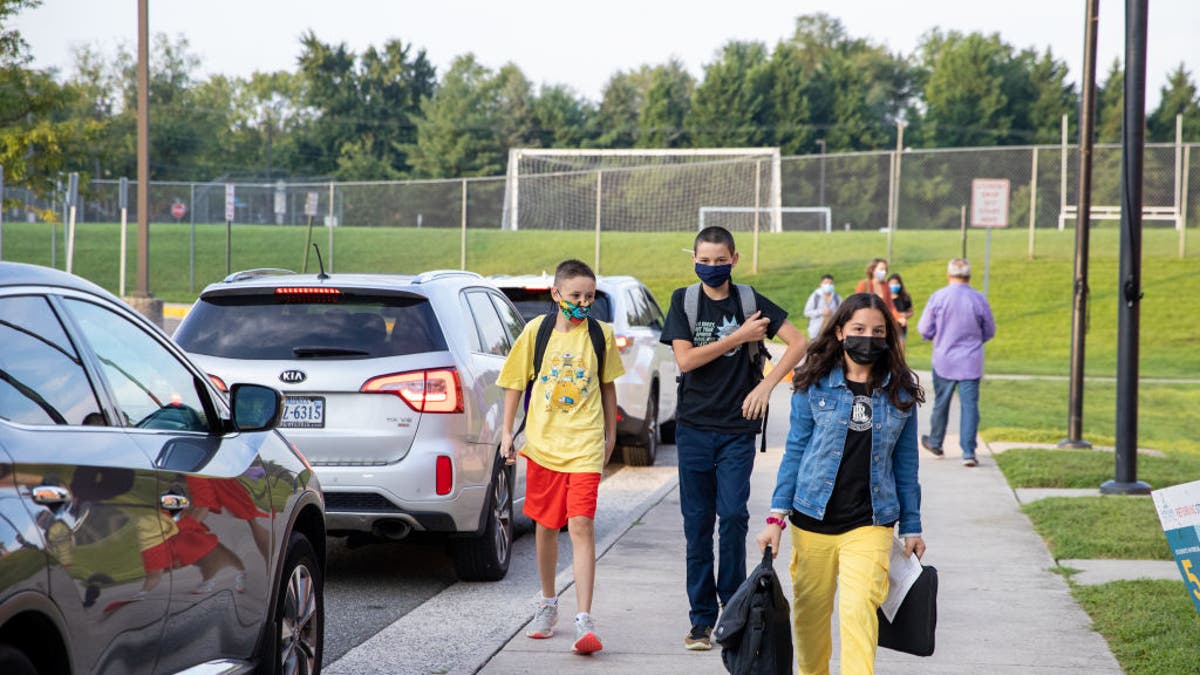‘No politics’ high school in Colorado sees huge growth in first year
Merit Academy founding board member John Dill on creating a public school that parents are flocking to.
Washington Post columnist Jay Mathews relayed the sentiments of a social studies teacher at Justice High School in Fairfax County, Virgina, who witnessed firsthand the harms of lowering academic standards for all students, in a recent column on education.
Social studies teacher Eric Wolf Welch, who Mathews called a "stellar educator," sent the columnist a passionate, 4,764-word email about the recent reported push to ease grading - a push that was in part prompted by the COVID-19 pandemic.
It's "the biggest issue facing secondary education in decades," Welch said, according to Mathews. "The impact of what schools do on this issue … goes beyond just high school. It will impact the future of our nation’s economy and our competitive status in the world."

A Fairfax County school bus sits in a depot, a day after it was announced the county would begin the school year all online, in Lorton, Virginia, U.S., July 22, 2020. (REUTERS/Kevin Lamarque)
In the wake of the pandemic, Welch told Mathews how one of his students wrote on a scholarship application that because of a policy prohibiting teachers from lowering grades after the first semester, he stopped working the rest of his sophomore year. The student also said he lost interest in schoolwork his junior year when he was told that he could turn in work late and that no assignment would be graded less than 50 percent.
OREGON LAWMAKER RIPS GOVERNOR FOR NIXING MATH, READING REQUIREMENTS: 'DEMOCRATS ABANDONED OUR KIDS'
Welch wrote that while most people pushing for grade reforms are well-meaning, implementing measures that may help the approximately 20 percent of low-performing students who would fail without them across the board could be "dangerous."
Instead of standardized test scores as the key measure of high school quality, Welch laments that administrators have found "creative ways to help students meet the standards — re-take tests, accept late work, don’t count attendance or participation in class toward a grade, don’t put zeros in the grade book for missing work, … do a one-month online course in the spring or summer that can be substituted for a year-long class and thus allow a student to pass a required course."
"And from top to bottom in the education system, this has become accepted practice — find a way to pass students at all costs, and, thus, keep that graduation rate up," he said.

Masked students arrive to the first day of class at Glasgow Middle School in Lincolnia, Virginia, on Monday, August 23, 2021, the first day back to school for the Fairfax County school district. (Amanda Andrade-Rhoades/For The Washington Post)
Fairfax County Public Schools spokeswoman Helen Lloyd defended the district's decisions not to rely on grades as a primary motivator for learning.
"Fairfax County Public Schools is committed to consistent grading regulation and practices where grades are an accurate reflection of student learning," she said. "Current policies include the separation of achievement and work habits, additional opportunities for students to demonstrate proficiency, and ongoing communication with students and parents. We aim to ensure that grades are based on demonstrated student achievement, knowledge, and skill proficiency and that they are separated from work habits."
Lloyd said research has shown using grades as a system of extrinsic rewards and consequences "can have a negative impact on learning" and "can be particularly demotivating for low-performing students."
"This is particularly true," she said, "when schools use a 0-100 scale in which a single zero carries a disproportionate impact on a student’s overall grade, making academic recovery feel out of reach."
"Our goal as a district is to promote grading practices in support of continuous student engagement in their learning and to ensure that student grades reflect evidence of learning," she continued. "We utilize practices such as reassessment and reasonable late-work policies to ensure that students have positive paths forward to demonstrating their learning."

Classroom with empty wooden desks. (iStock)
Rory Cooper, a parent of three FCPS elementary student students, disputed Lloyd's narrative.
"The Fairfax board has consistently demonstrated a cavalier and even destructive attitude toward academic excellence from their intentional dismantling of Thomas Jefferson's standards to their latest superintendent hire," Cooper told Fox News Digital. "Kids learn and grow differently, but Fairfax seems hell-bent on holding some kids back and ignoring their core mission of teaching the fundamentals. My third grader recently saw a headline that they may get rid of letter grades and was upset because she wants goals to shoot for. We shouldn't let these adults keep harming children and our collective future. The people trying to destroy public education are the very people we have entrusted to protect it."
States like Oregon have begun to ditch standardized testing. Democratic Gov. Kate Brown signed Senate Bill 744, dropping proficiency requirements in reading, writing or math before graduation. Charles Boyle, Brown's deputy communications director, said that the new standards for graduation will help benefit the state’s "Black, Latino, Latinx, Indigenous, Asian, Pacific Islander, Tribal, and students of color."
CLICK HERE TO GET THE FOX NEWS APP
Yet, Fox News contributor Jonathan Turley argued the opposite.
"If there are no such standardized scores, there is no ability to easily compare the achievement of schools or even the achievement of students applying for admission," Turley, a constitutional scholar, wrote in an opinion piece for Fox News Digital.
Additionally, he argued, eliminating standardized testing means that it would be much more difficult to prove that the universities were engaging in racial discrimination.
"With no testing scores for comparison, it would be nearly impossible to show that race was the major or dominant factor in admissions," he wrote.
Objecting to grades as "demotivating" for students, Turley told Fox News Digital, "is like objecting to stopwatches as demotivating for athletes."


